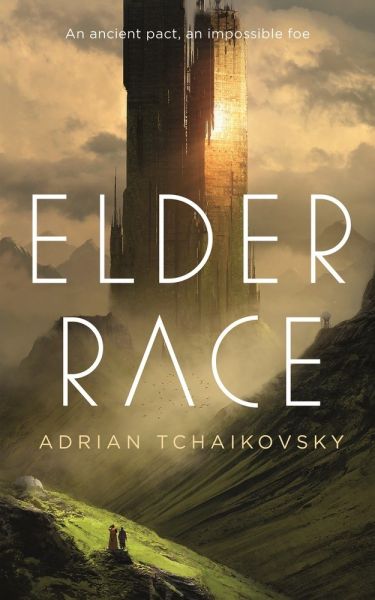Welcome to the Black Parade
Elder Race
By Adrian Tchaikovsky

23 Dec, 2021
Adrian Tchaikovsky’s 2021 Elder Race is a stand-alone science fiction novella.
Plagued by demonic invasion, the people of Ordwood begged Lannesite for aid. Lannesite’s Queen decreed that Ordwood’s problems, while tragic, were not Lannesite’s problems. No aid would be forthcoming.
Outraged at her mother’s lack of compassion, the Queen’s least impressive offspring, Lynesse Fourth Daughter, convinced herself to embrace bold action. Nyrgoth Elder, last of the ancients, long ago promised that Lannesite could call on him in their hour of need. Whether the old sorcerer is still alive is unknown. Nobody has seen him in a lifetime. Nevertheless, Lynesse sets out for his isolated mountain tower.
Old Nyrgoth is still alive, scarcely aged a day. However, he is no sorcerer.
Nyr Illim Tevitch, anthropologist second class of Earth’s Explorer Corps, was part of an expedition dispatched to assess how Earth’s colonies, founded by generation ships before the great collapse, have fared in their centuries of isolation. Nyr remained behind to monitor this world’s colony, resorting to hibernation to extend his already enhanced lifespan. He was never supposed to interact with the locals and only did so a lifetime ago. An ambitious local had mastered some off-world technology and would have unleashed a reign of evil if the off-worlder hadn’t intervened.
Nyr has not heard from Earth in centuries. Why this might be isn’t clear; he suspects the worst. Nevertheless, he is committed to carry out his assigned task according to the rules he was initially given. It takes some persuasion on the part of Lynesse to convince the scientist to venture from his isolated research facility.
Nyr does not claim to be a wizard. His efforts to explain that he is a scientist and not sorcerer are sabotaged by the fact that Lynesse’s language makes no distinction between the two. No matter how many synonyms he uses to explain his mundane nature, Lynesse hears only that he is a wizard, sorcerer, or mage.
The demonic invasion in Ordwood is not another case of a bright barbarian scholar getting his hands on ancient hi-tech. The things devastating Ordwood have nothing to do with forgotten human machinery. Nyr finds himself facing something as far outside his comprehension as his robots are outside Lynesse’s.
~oOo~
Nyr is not merely a middling grade anthropologist of the sort one might abandon in the field without too much regret. He is also the product of ambitious genetic engineering, thus his exceptional height, ability to regenerate, long lifespan, and horns. However, genetic artistry is not without its drawbacks. Nyr is saddled with brain chemistry that pushes him towards profound depression. He deals with that with technology, a tech that allows him to wall off his feelings and operate on pure logic. Is this a perfect coping mechanism? Not at all.
Tchaikovsky dedicates his story to Gene Wolfe [1], in particular to Wolfe’s 1967 “Trip, Trap,” with which you are all familiar from the copies of Orbit 2 that you purchased as soon as you read my review of Orbit 2.On the vanishingly small chance you have not read your copy, Wolfe’s story also features a pair of characters, one of whom interprets what he sees through a superstitious lens, while the other is rigidly scientific. Neither of them is entirely correct.
The story’s brevity precludes answering questions some readers may have, such as how the original colonists managed to lose most of their technology without dying off in the process. It does find time to examine the utility of non-interference policies; there’s a lot that Nyr could have done to improve the lot of people on this world that he chose not to do, simply to minimize cultural contamination.
This novella was short and to the point, just the thing for an evening when my tendency to overcommit caught up with me. Nyr and Lynesse are in their own ways memorable characters. Tchaikovsky’s tale is complete, but there’s room here for sequels. I would read them if forthcoming.
Elder Race is available here (Amazon US), here (Amazon Canada), here (Amazon UK), here (Barnes & Noble), here (Book Depository), and here (Chapters-Indigo).
1: Having read the dedication, I swiftly confused Wolfe with Vance. Alas, speculations regarding whether “Lynesse” is a reference to Vance’s Elder Isles of Lyonesse slam face first into the issue that Wolfe and Vance were rather inconsiderately two entirely different people.
